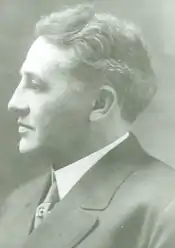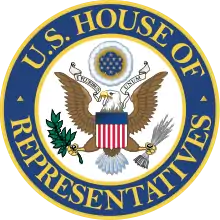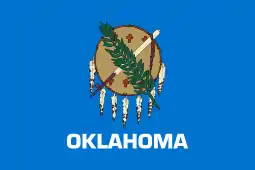Charles D. Carter
Charles David Carter (August 16, 1868 in Chickasaw – April 9, 1929) was a Native American politician elected as U.S. Representative from Oklahoma, serving from 1907 to 1927. During this period, he also served as Mining Trustee for Indian Territory, 1900–1904, appointed by President William McKinley.
Charles Carter | |
|---|---|
 | |
| Member of the U.S. House of Representatives from Oklahoma's 3rd district | |
| In office March 4, 1915 – March 3, 1927 | |
| Preceded by | James S. Davenport |
| Succeeded by | Wilburn Cartwright |
| Member of the U.S. House of Representatives from Oklahoma's 4th district | |
| In office November 16, 1907 – March 3, 1915 | |
| Preceded by | Constituency established |
| Succeeded by | William H. Murray |
| Personal details | |
| Born | Charles David Carter August 16, 1868 Boggy Depot, Indian Territory, U.S. (now Oklahoma) |
| Died | April 9, 1929 (aged 60) Ardmore, Oklahoma, U.S. |
| Political party | Democratic |
| Spouse(s) | Ada Wilson Cecile Whittington Jones |
| Children | 4 |
| Signature | |
Carter had earlier served as auditor for the Chickasaw Nation and was elected to the Chickasaw Council. He also served as superintendent of Chickasaw Schools.
Biography
Born near Boggy Depot, Choctaw Nation, Indian Territory (now Oklahoma), Carter moved with his father to Mill Creek, a stage stand on the western frontier of the Chickasaw Nation, in April 1876. Carter was of Chickasaw and Cherokee descent.[1] He attended the Indian day schools and Chickasaw Manual Training Academy at Tishomingo.
He was employed on a ranch from 1887 to 1889 and in a mercantile establishment in Ardmore, Oklahoma, from 1889 to 1892. He married Ada Gertrude Wilson on December 29, 1891 and they had four children, Stella LeFlore, Italy Cecil, Julia Josephine, and Benjamin Wisnor Carter, Jr. After Ada's death on January 30, 1901, he married Cecile Whittington Jones on January 8, 1911.[2]
Public service
Carter served as auditor of public accounts of the Chickasaw Nation 1892-1894, a member of the Chickasaw Council in 1895, then superintendent of schools of the Chickasaw Nation in 1897. He was appointed mining trustee of Indian Territory by President William McKinley in November 1900 and served four years.[3]
Carter was Secretary of the first Democratic executive committee of the proposed State of Oklahoma from June to December 1906. Upon the admission of Oklahoma as a State into the Union, he was elected as a Democrat to the Sixtieth and to the nine succeeding Congresses, serving from November 16, 1907, to March 4, 1927.[4]
Carter served as chairman of the Committee on Indian Affairs (Sixty-fifth Congress). He was an unsuccessful candidate for renomination in 1926. He was appointed to the State highway commission, serving 1927-1929.
Death
Carter died in Ardmore, Carter County, Oklahoma, on April 9, 1929. He is interred at Rose Hill Cemetery in Ardmore.[5]
References
- Lee, M. J. "7 pols with Native American heritage." Politico. 4 May 2012. Retrieved 6 May 2012.
- "Charles D. Carter". Lawrence Stanley Family Genealogy. Retrieved May 24, 2013.
- "Charles D. Carter". Biographical Directory of the United States Congress. Retrieved May 24, 2013.
- "Charles D. Carter". Govtrack US Congress. Retrieved May 24, 2013.
- "Charles D. Carter". The Political Graveyard. Retrieved May 24, 2013.
External links
- Charles David Carter Profile and Videos - Chickasaw.TV
| Wikimedia Commons has media related to Charles D. Carter. |
- United States Congress. "Charles D. Carter (id: C000196)". Biographical Directory of the United States Congress.
- Encyclopedia of Oklahoma History and Culture - Carter, Charles
- Charles D. Carter at Find a Grave
| U.S. House of Representatives | ||
|---|---|---|
| New constituency | Member of the U.S. House of Representatives from Oklahoma's 4th congressional district 1907–1915 |
Succeeded by William H. Murray |
| Preceded by James S. Davenport |
Member of the U.S. House of Representatives from Oklahoma's 3rd congressional district 1915–1927 |
Succeeded by Wilburn Cartwright |
| Preceded by John Hall Stephens |
Chair of the House Indian Affairs Committee 1917–1919 |
Succeeded by Homer P. Snyder |

